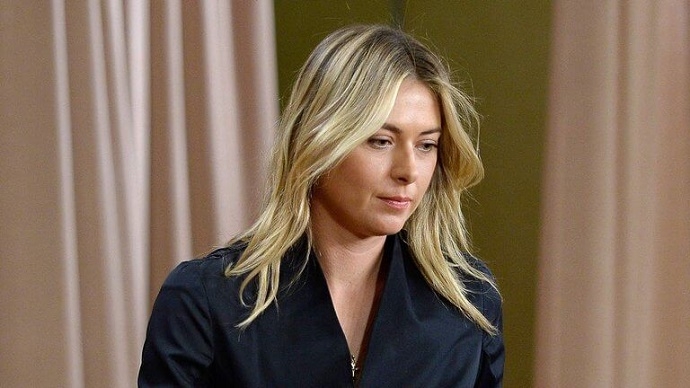 Maria Sharapova[/caption]
Maria Sharapova[/caption]
Russia tennis player, Maria Sharapova has been hit with a two-year ban by the International Tennis Federation (ITF) for testing positive for banned substance meldonium.
The ruling by an independent three-person panel on Wednesday said Sharapova, 29, did not intend to cheat but that she bore “sole responsibility” and “very significant fault” for the positive test.
However the world number 9 said she will appeal the decision, which was backdated to 26 January 2016.
Advertisement
“The ITF tribunal unanimously concluded that what I did was not intentional,” Sharapova said in a statement.
“The tribunal found that I did not seek treatment from my doctor for the purpose of obtaining a performance enhancing substance. The ITF spent tremendous amount of time and resources trying to prove I intentionally violated the anti-doping rules and the tribunal concluded I did not. You need to know that the ITF asked the tribunal to suspend me for four years — the required suspension for an intentional violation — and the tribunal rejected the ITF’s position.
“I cannot accept an unfairly harsh two-year suspension,” the five-time Grand Slam winner added.
“The tribunal, whose members were selected by the ITF, agreed that I did not do anything intentionally wrong, yet they seek to keep me from playing tennis for two years.”
Advertisement
The Women’s Tennis Association issued a statement on the ruling, saying in part, “It is important at all times for players to be aware of the rules and to follow them. In this case, Maria has taken responsibility for her mistake from the outset. The WTA supports the process that the ITF and Maria have followed.”
The 29-year-old was provisionally banned in March after testing positive for meldonium following her Australian Open quarter-final defeat by Serena Williams on 26 January.
However, Sharapova had already she was unaware that the drug she had been taking since 2006, mildronate, was also known as meldonium. That drug became a banned substance on the World Anti-Doping Agency’s list as of Jan. 1.
Sharapova, who was scheduled to represent Russian at the Olympics in Rio de Janeiro in August, will now be replaced by Ekaterina Makarova, Russian Tennis Federation president Shamil Tarpischev said on Wednesday.


